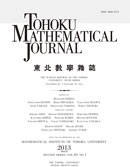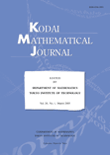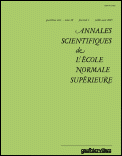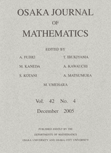
INTERNATIONAL JOURNAL OF MATHEMATICS
Scope & Guideline
Fostering Global Discourse in Mathematics
Introduction
Aims and Scopes
- Algebraic Geometry and Topology:
Research in algebraic geometry and topology is a core focus, encompassing topics such as moduli spaces, Fano varieties, and knot theory. This area investigates the properties of spaces and their algebraic structures, often utilizing advanced techniques in both algebra and geometry. - Differential Geometry and Geometric Analysis:
The journal features significant contributions in differential geometry, particularly regarding curvature, flow equations, and geometric structures of manifolds. This includes the study of Kähler metrics, Ricci flow, and other curvature-related phenomena. - Complex Analysis and Several Complex Variables:
A strong emphasis is placed on complex analysis, particularly in the study of holomorphic functions, complex manifolds, and their invariants. This research often intersects with algebraic geometry and differential geometry. - Mathematical Physics and Quantum Theory:
The journal publishes work linking mathematics with physics, especially in areas like quantum algebra, C*-algebras, and the mathematical foundations of quantum mechanics. This includes the study of symmetries and invariants in physical systems. - Partial Differential Equations and Dynamical Systems:
Research related to partial differential equations (PDEs) and dynamical systems is prevalent, focusing on existence, uniqueness, and regularity of solutions. This area seeks to understand the behavior of solutions under various conditions and parameters. - Category Theory and Homological Algebra:
The journal includes studies in category theory and homological algebra, exploring the relationships between different mathematical structures and the algebraic properties that arise from these connections.
Trending and Emerging
- Higher-Dimensional Geometry:
There is an increasing interest in higher-dimensional geometry, particularly in the study of manifolds and their properties. This trend highlights the growing complexity of geometric structures and their applications in various branches of mathematics. - Nonlinear PDEs and Variational Methods:
Research on nonlinear partial differential equations (PDEs) and variational methods is gaining momentum. This reflects a broader trend towards understanding complex systems and their solutions through variational principles. - Arithmetic Geometry and Number Theory Interactions:
The interplay between arithmetic geometry and number theory has become more pronounced, with a focus on moduli problems and the geometric aspects of number theory. This emerging theme emphasizes the relevance of geometry in understanding number-theoretic concepts. - Mathematical Machine Learning and Data Science:
The integration of mathematical techniques with machine learning and data science is a burgeoning area of research. This trend illustrates the increasing importance of mathematics in analyzing data and developing algorithms. - Quantum Geometry and Topological Quantum Field Theory:
There is a notable rise in research related to quantum geometry and topological quantum field theories. This emerging scope reflects the ongoing interest in the mathematical foundations of quantum mechanics and their implications for geometry.
Declining or Waning
- Classical Analysis Techniques:
There has been a decline in papers focusing on classical analysis techniques, such as elementary methods in real analysis. As the field evolves, more sophisticated approaches are often preferred, leading to less emphasis on traditional analysis. - Elementary Number Theory:
Research specifically centered on elementary number theory has become less frequent. Although number theory remains a vibrant field, the focus has shifted towards more complex algebraic and analytic methods that integrate with other mathematical disciplines. - Graph Theory:
Papers dedicated solely to graph theory, while still relevant, are increasingly less common. The trend suggests a move towards interdisciplinary applications of graph theory, rather than standalone studies. - Linear Algebra Applications:
The exploration of linear algebra applications in pure mathematics has diminished. As mathematical research becomes more specialized, applications of linear algebra are often integrated into broader studies rather than treated in isolation.
Similar Journals

ANNALES DE L INSTITUT FOURIER
Championing Rigorous Research and CollaborationANNALES DE L INSTITUT FOURIER is a premier academic journal published by ANNALES INST FOURIER, specializing in the fields of Algebra and Number Theory as well as Geometry and Topology. Since its establishment, the journal has garnered a distinguished reputation, evidenced by its Q1 quartile ranking in the 2023 category assessments and its Scopus Rank of #37 out of 119 in Algebra and Number Theory, and #34 out of 106 in Geometry and Topology, placing it within the top percentile of its field. The journal serves as a vital platform for disseminating groundbreaking research and innovative methodologies, catering to a global audience of researchers, professionals, and students. With a commitment to the advancement of mathematical sciences, ANNALES DE L INSTITUT FOURIER invites contributions that push the boundaries of knowledge and foster collaboration across disciplines. Although it does not offer open access, the rigorous peer-review process ensures that published papers meet the highest academic standards, making it a critical resource for anyone engaged in advanced mathematical research.

Documenta Mathematica
Connecting Mathematicians with Cutting-Edge ResearchDocumenta Mathematica is a premier academic journal published by the European Mathematical Society (EMS), making significant contributions to the field of mathematics since its inception. With an Open Access model established in 1996, the journal ensures that scholarly works are freely available to a global audience, promoting widespread dissemination of mathematical research. Based in Germany, it serves as a vital platform for mathematicians, covering a wide array of topics within the discipline, evidenced by its impressive Q1 ranking in the miscellaneous category of mathematics as of 2023. Featuring rigorous peer-reviewed articles that span the latest trends and breakthroughs in the discipline, Documenta Mathematica also retains a commendable position among its peers with a Scopus rank of 163 out of 399, placing it in the 59th percentile for general mathematics. Researchers, professionals, and students alike will benefit from the robust scholarly content and the journal's commitment to advancing mathematical knowledge.

Annales Polonici Mathematici
Bridging Theory and Practice in MathematicsAnnales Polonici Mathematici, a prestigious journal published by the Polish Academy of Sciences, Institute of Mathematics-IMPAN, serves as a vital platform for disseminating innovative research in the field of mathematical sciences. Established as an influential publication within the academic community, this journal addresses a wide array of topics within the Mathematics (miscellaneous) realm, highlighting contributions from both seasoned researchers and emerging scholars. Although currently classified in Q3 of the Mathematics category based on the 2023 metrics, it is steadily making strides towards greater visibility and impact, evidenced by its ongoing convergence years from 2008 to 2024. With its ISSN 0066-2216 and E-ISSN 1730-6272, the journal attracts a diverse readership eager to explore cutting-edge mathematical theories and applications. While the journal does not operate under an open access model, the integrity and rigor of its peer-reviewed content make it an essential resource for researchers, professionals, and students aiming to deepen their understanding and advance their knowledge in mathematics.

JOURNAL OF DIFFERENTIAL GEOMETRY
Unveiling the complexities of differential geometry.JOURNAL OF DIFFERENTIAL GEOMETRY, a premier publication by INT PRESS BOSTON, INC, has established itself as a leading forum for the dissemination of high-quality research in the fields of differential geometry, algebra, and analysis. With an impressive history that spans from 1967 to 2024, this journal is recognized for its rigorous peer-reviewed articles, contributing significantly to the advancement of mathematical theories and innovative approaches. Notably, the journal boasts a Q1 ranking in key categories such as Algebra and Number Theory, Geometry and Topology, and Analysis, reflecting its pivotal role within the mathematics community. Its Scopus rankings reinforce its reputation, placing it among the top-tier journals in its respective fields, with a 97th percentile ranking in Algebra and Number Theory, further emphasizing its influence. While the journal does not offer Open Access options, it remains a critical resource for researchers, professionals, and students aiming to stay at the forefront of developments in differential geometry and related domains. Engage with groundbreaking research and explore new methodologies that are shaping the future of mathematics.

TOHOKU MATHEMATICAL JOURNAL
Fostering Innovation in Mathematical ResearchTOHOKU MATHEMATICAL JOURNAL, published by TOHOKU UNIVERSITY, is a distinguished academic journal committed to the advancement of mathematical research. Established in 1949, the journal has sustained a long-standing tradition of disseminating high-quality, peer-reviewed articles that contribute significantly to various branches of mathematics. With its scope encompassing a broad range of topics within the field, TOHOKU MATHEMATICAL JOURNAL aims to foster intellectual exchange and innovation among mathematicians worldwide. Though currently not an open-access publication, it is indexed in Scopus, holding a respectable Q2 ranking in the miscellaneous mathematics category as of 2023, which signifies its relevance and influence in the academic community. Researchers, professionals, and students alike will find valuable insights and contemporary developments that reflect the journal's dedication to excellence in mathematical scholarship.

Kodai Mathematical Journal
Fostering Collaboration in the World of MathematicsKodai Mathematical Journal is a distinguished publication dedicated to advancing the field of mathematics, particularly in miscellaneous areas. Established in 1949, this esteemed journal has been a reputable source for researchers and practitioners who seek to contribute to the rich landscape of mathematical knowledge. Published by KINOKUNIYA CO LTD, the journal is based in the academic environment of Tokyo Institute of Technology and serves a global audience with rigorous and insightful research articles. Despite its current Q3 quartile ranking in the Scopus Mathematics category, which reflects its niche but impactful contributions, the journal is poised for growth; the convergence of traditional and novel mathematical techniques promises to enhance its relevance further. Researchers, professionals, and students are encouraged to engage with the rich content of the journal, aimed at fostering collaboration and nurturing innovation in the mathematical community. While currently not available as Open Access, Kodai Mathematical Journal remains a critical resource for those passionate about mathematics and its applications.

COMMUNICATIONS IN ANALYSIS AND GEOMETRY
Elevating Scholarly Discourse in MathematicsCOMMUNICATIONS IN ANALYSIS AND GEOMETRY, published by INT PRESS BOSTON, INC, is a prestigious journal dedicated to advancing the fields of analysis, geometry, and statistics. With an impressive Q1 ranking in these categories for 2023, the journal stands out as a leading platform for cutting-edge research and scholarly discourse. Established in 1996, the journal has been instrumental in fostering a vibrant academic community that engages with both theoretical and applied aspects of mathematics. Despite not being an open-access journal, it continues to attract a wide readership owing to its rigorous peer-review process and high-impact publications. The journal's influence is further underlined by its respectable Scopus rankings, specifically in Geometry and Topology, where it ranks 40th out of 106, highlighting its significance in the scholarly landscape. Researchers, professionals, and students alike will find COMMUNICATIONS IN ANALYSIS AND GEOMETRY to be an invaluable resource for the latest findings and developments in these interconnected mathematical disciplines.

ANNALES SCIENTIFIQUES DE L ECOLE NORMALE SUPERIEURE
Shaping the Future of Mathematics, One Article at a TimeANNALES SCIENTIFIQUES DE L ECOLE NORMALE SUPERIEURE is a distinguished journal published by the Société Mathématique de France, dedicated to advancing the field of mathematics through high-quality research articles. With a robust impact factor and categorized as Q1 in Mathematics (Miscellaneous) as of 2023, this journal ranks in the top 16% of mathematics publications, showcasing its importance and influence in the discipline. Available in both print (ISSN: 0012-9593) and electronic formats (E-ISSN: 1873-2151), ANNALES SCIENTIFIQUES serves as a central hub for innovative mathematical theories and methodologies, appealing to a diverse audience of researchers, professionals, and students alike. The journal publishes research that spans various domains within mathematics, fostering a collaborative environment for idea exchange. As it converges from 1997 to 2024, it continues to shape the mathematical landscape, providing essential insights and developments within the global academic community. Located in Paris, France, the journal invites contributions that push boundaries and advance the understanding of complex mathematical concepts.

Tunisian Journal of Mathematics
Unlocking New Dimensions in Mathematical Research.Tunisian Journal of Mathematics, an esteemed publication by Mathematical Sciences Publishers, serves as a vital platform for the dissemination of groundbreaking research in the field of mathematics. With an ISSN of 2576-7658 and an E-ISSN of 2576-7666, this journal has quickly established itself since its inception in 2019, evidenced by its impressive Q1 ranking in Mathematics (miscellaneous) for 2023 and Scopus Rank #141 out of 399, positioning it in the 64th percentile among its peers. Dedicated to fostering a vibrant academic community, it invites high-quality contributions that push the boundaries of mathematical theory and practice while advocating open access principles to enhance research visibility and accessibility. Located in Berkeley, California, the journal's editorial board comprises distinguished scholars committed to upholding rigorous peer-review standards, ensuring that only the most relevant and impactful research is published. The Tunisian Journal of Mathematics is not just a journal; it is a cornerstone for researchers, professionals, and students eager to explore the vast and dynamic landscape of mathematics.

OSAKA JOURNAL OF MATHEMATICS
Exploring New Dimensions of Mathematical KnowledgeOSAKA JOURNAL OF MATHEMATICS, established in 1949 and published from Japan, stands as a reputable platform dedicated to advancing the field of mathematics. With an ISSN of 0030-6126, this journal showcases research in various mathematical disciplines, contributing significantly to both theoretical and applied mathematics. Though it currently holds a Q3 designation in the miscellaneous mathematics category, the journal aims to enhance its impact and visibility within the academic community. Researchers can benefit from the latest insights and findings, making it an essential read for anyone involved in mathematical studies. The journal emphasizes quality over quantity, providing a selective peer-reviewed process that ensures rigorous academic standards. Furthermore, while it is not an open-access journal, it maintains a commitment to disseminating valuable mathematical knowledge across the globe, serving the scholarly community through traditional subscription-based access. OSAKA JOURNAL OF MATHEMATICS is an invaluable resource for professionals, researchers, and students seeking to stay at the forefront of mathematical research and discussions.